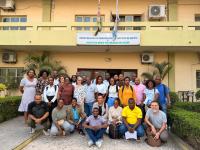Universal Health: everyone, everywhere | World Health Day 2019
 World Health Day is celebrated in April 7, and this year marks the end of the celebrations of the 70th anniversary of the World Health Organization (WHO). In the region of the Americas, these celebrations were framed under the theme "Universal health: for all and everyone, everywhere". The aim of the 'universal health' is to ensure that all people have access, without discrimination, to quality integral services, without facing financial difficulties. To achieve this, it is necessary to define and implement multisectoral policies and actions to address the social determinants of health and to promote the commitment of all society to health and well-being. Therefore, universal health is not just about ensuring that everyone is covered, but that everyone has access to care when they need it, wherever they are.
World Health Day is celebrated in April 7, and this year marks the end of the celebrations of the 70th anniversary of the World Health Organization (WHO). In the region of the Americas, these celebrations were framed under the theme "Universal health: for all and everyone, everywhere". The aim of the 'universal health' is to ensure that all people have access, without discrimination, to quality integral services, without facing financial difficulties. To achieve this, it is necessary to define and implement multisectoral policies and actions to address the social determinants of health and to promote the commitment of all society to health and well-being. Therefore, universal health is not just about ensuring that everyone is covered, but that everyone has access to care when they need it, wherever they are.
The date is celebrated after the 2018 Global Conference on Primary Health Care in Astana and ahead of the UN General Assembly High-Level Meeting on Universal Health Coverage to be held in New York in September 2019. Both events are aimed at discussing strategies focusing on the key role of primary health care (PHC) to advance towards universal health. In the Americas, this campaign is focused on equity and solidarity, addressing barriers to access to health and health services.
Universal health: the united society to guarantee health for all
As an expression of 'Health for All' in the 21st century, in order to achieve universal coverage, it is necessary to involve the sectors of society in order to combat poverty, social injustice, educational gaps and precarious living conditions, among other factors. In this context, everyone has a role to play, such as stimulating debate and contributing to the dialogue on public health policies.
Decision makers can:
- Participate in structured discussions with diverse stakeholders in the community who are affected and are essential to ensuring universal health;
- Listen to the demands, opinions and expectations of the population on universal health issues in order to improve policy responses. It is possible, for example, to consult the population with surveys;
- Collaborate with community organizations and advocate universal health to explore viable solutions.
Health professionals can:
- Discuss intersectoral policies to ensure the availability, accessibility, relevance and competence of human resources for universal health;
- Discuss the needs of interprofessional, prepared and motivated work teams to meet people's health needs, wherever they live;
- Raise voices so that health workers can have a stable and decent job, as this strengthens both the health system and the socio-economic development of the country;
- Create movements that promote high-level agreements between the education and health sectors in order to achieve quality standards in the training of health professionals, based on the specific needs of the community;
- Defend that the gender perspective be incorporated in the new organizational models and in contracting in health services.
People and communities can:
- Exercise the right to health and organize national movements towards universal health;
- Communicate needs, opinions and expectations to policy makers, local politicians, ministers and other representatives of the population;
- Be heard through social media to ensure that community health needs - and other needs - are taken into account and prioritized at the local level;
- Invite civil society organizations to help make community needs known to policymakers;
- Share experiences with the media;
- Organize activities such as discussion forums, policy debates, concerts, marches and interviews to give people the opportunity to interact with representatives on the topic of universal health through the media;
- Advocate for governments to implement strategies that motivate health teams, with economic incentive, professional development, and quality of life measures to mobilize them to remain in remote and neglected areas.
The media, as key players, can:
- Highlight initiatives and interventions that help improve access to quality services and financial protection for individuals and communities;
- Show the difficult access to the health services that people need;
- To make policy makers and politicians accountable to their commitments to universal health, focusing on strengths, weaknesses and new challenges to be faced (such as the increase in chronic noncommunicable diseases or the aging of the population);
- To create platforms for dialogue between beneficiaries, communities, their political representatives and policy makers, through debates, interviews and radio programs, for example.



